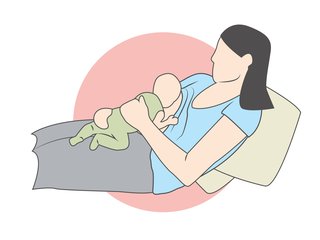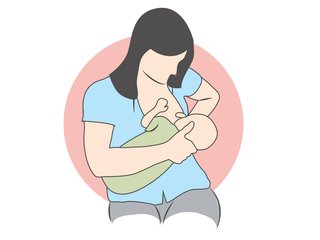You may find your baby prefers to feed on 1 side during breastfeeding. This is quite common.
Reasons can include:
- a physical cause - for example, a sore head after a difficult birth
- a preference - due to the way your baby was lying in the womb
- differences in nipple or areola shape
- a milk flow difference between the 2 breasts
- you may be more comfortable feeding on 1 side
This can easily be resolved with advice and support from a lactation nurse or midwife.
Non-urgent advice: Talk to your GP or public health nurse (PHN) if:
- your baby has been feeding well from both breasts but suddenly latches to only 1 side
There may be a medical reason. For example, an ear infection, nasal congestion or soreness on 1 side.
If you have mastitis or have recently recovered, your milk taste may have changed or there may be a slow flow of milk. These symptoms usually pass.
Ask our breastfeeding experts
Practical tips
If your baby prefers feeding in a certain position, try sliding them over to the other breast while keeping the same position.
For example, your baby may be on the right and breastfeeding well with a cross-cradle position. Move them over to the left, keeping a 'football hold' position.
You can also try to:
- start feeds on less preferred side
- offer the less preferred side when your baby is less hungry
Laid back position

The cross-cradle position

Football hold position

Other things you can try
-
try different positions - for example, the laid-back position can work best for babies with a sore head or arm
-
offer your baby the less preferred side when they are in a light sleep - they will be less aware and less hungry
-
offer your baby the less preferred side while distracting them with walking or rocking
-
give your baby skin-to-skin care before feeding
If none of these work, get advice from a lactation nurse or midwife.
Express milk regularly while you try to get them feeding on the less preferred side. This will help to protect your milk supply.
Concerns with your breast milk supply
If one side preference continues
Many mothers have exclusively breastfed babies on 1 side. In most cases, it is possible to make enough milk. But it depends on the milk-making and storage capacity of the breast.
A baby who feeds only on 1 side may need to feed more often than a baby taking both sides.
Each breast may be a different size if your baby is feeding only on 1 side. But when you stop breastfeeding, your breasts will return to about the same size.
In some cases, long-term one side preference can lead to:
- low or no milk production on the less preferred side
- engorgement and mastitis
Torticollis
Some babies may have torticollis (wry neck). This is where the muscles of the neck are out of alignment. When a baby is born with this condition, it's known as congenital torticollis. It can also develop later.
In rare cases, torticollis can be caused by instrumental delivery when your baby is being born. Forceps or vacuum deliveries can strain the muscles of the neck.
Torticollis can lead to feeding problems such as difficulty attaching to the breast. It can also lead to preferred sides or positions.
Your paediatrician or GP can refer your baby to a physiotherapist. This will help to relieve symptoms.
Getting support
You can get support from your:
- lactation nurse or midwife
- PHN
- GP
- paediatrician
If your baby is under 6 weeks, the lactation nurse or midwife in your maternity unit can check your baby. This will be free of charge. Most units run postnatal breastfeeding clinics. You can asked to be referred.
If your baby is older, your PHN or local breastfeeding support group may be able to help you.